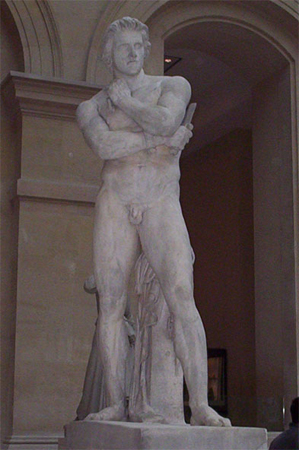Spartacus Redux
Friday, February 19, 2010
posted by Steve Trout
 Print This Post
Print This Post
Howard Fast’s book Spartacus is a kind of paradox; a book about the spirit of freedom written by an avowed Communist. There are suggestions that the free slaves will share the wealth, but the main idea of the book is that all people must be free. It is subversive in a way, even today. Howard Fast, like the screen-writer for the movie, Dalton Trumble, was jailed by the House UnAmerican Activies Committee for refusing to name names. He later renounced Communism after learning of Stalin’s crimes against his own countrymen and the repression of Hungary in 1956. But Spartacus had been written in 1951, while Fast believed in Communism. Because of the political climate of the time, he had to publish it himself, with the help of friends and fans who gave him money in advance.
For an account of how he came to write Spartacus, go here.
Gracchus, a politician, is a viewpoint character. Here he explains how the Republic works.
You see, we live in a republic.That means that there are a great many people who have nothing and a handful who have a great deal. And those who have a great deal must be protected and defended by those who have nothing. Not only that, but those who have a great deal must guard their property, and therefore those who have nothing must be willing to die for the property of people like you and me and our good host Antonious. Also, people like ourselves have many slaves. These slaves do not like us. […] So the many, many people who have no slaves at all must be willing to die in order for us to have our slaves. Rome keeps a quarter of a million men under arms. These soldiers must be willing to go to foreign lands, to march their feet off, to live in filth and qualor, to wallow in blood — so that we may be safe and live in comfort and increase our personal fortunes. When these troops went to fight Spartacus, they had less to defend than the slaves. Yet they died by the thousands fighting the slaves. One could go further. The peasants were in the army in the first place because they have been driven off their land by the latifundia (plantations). The slave plantation turns them into landless paupers; and then they die to keep the plantation intact.
[…]
[W]hat does the brave Roman soldier stand to lose if the slaves conquer? Indeed, they would need him desperately, for there are not enough slaves to till the land properly. There would be land enough for all, and our legionary would have what he dreams of most, his plot of land and his little house. Yet he marches off to destroy his own dreams, that sixteen slaves may cary a fat old hog like me in a padded litter.
[…]
The politician is the glue in this crazy house. The patrician can’t do it himself. In the first place, he thinks like you, and Roman citizens don’t like to be told that they are cattle. They aren’t, which you will learn some day. In the second place, he knows nothing about the citizen. If it were left to him, the structure would collapse in a day. So he comes to people like myself. He couldn’t live without us. We rationalize the irrational. We convince the people that the greatest fulfillment in life is to die for the rich. We convince the rich that they must part with some of their riches to keep the rest. We are magicians. We cast an illusion and the illusion is foolproof. We say to the people – you are the power. Your vote is the source of Rome’s strength and glory. You are the only free people in the world. There is nothing more precious than your freedom, nothing more admirable than your civilization.
[…]
And they feel proud and superior because they are not slaves. No matter how low they sink, if they sleep in the gutter, if they sit in the public seats at the racetrack and the arena all day, if they strangle their infants at birth, if they live on the dole and never lift a hand to do a day’s work from birth to death, nevertheless they are not slaves. They are dirt, but every time they see a slave, their ego rises and they feel full of pride and power. Then they know that they are Roman citizens and all the world envies them. And this is my peculiar art, Cicero. Never belittle politics.
I was interested to learn that the slave plantation did not arise in Rome, but was borrowed, as was crucifixion, from the African city of Carthage. Kind of ironic in view of later history. The Republic of Rome that Robert E. Howard instinctively hated so much is long gone, but politicians still perform the same function now as they did then.


